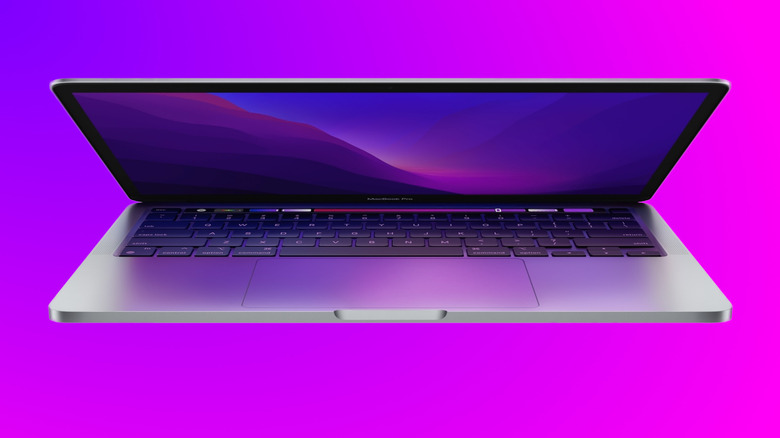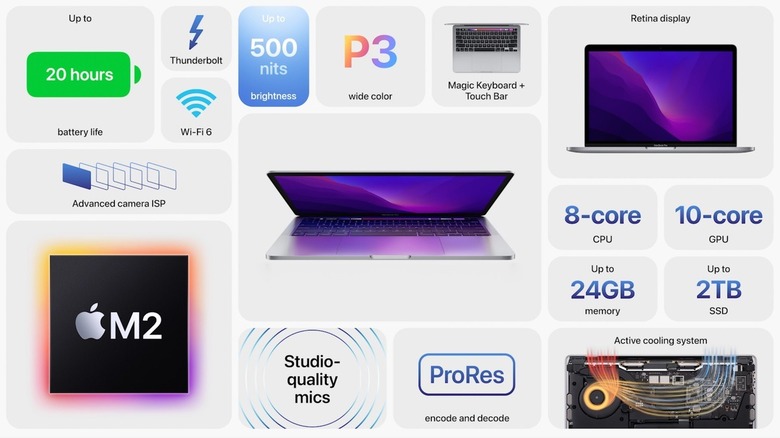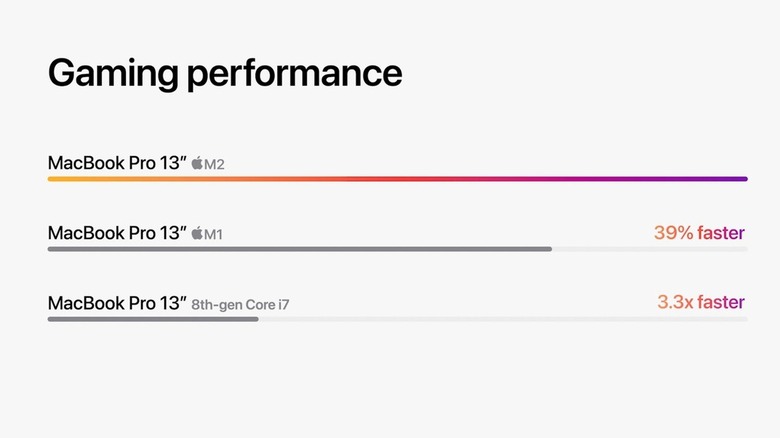2022 MacBook Pro 13 Gets Apple M2: Why That Matters
The 2022 MacBook Pro 13 is going to make use of the company's new Apple M2 chip, the tech giant has announced, promising at WWDC 2022 that its "most portable" pro notebook is getting even better. Alongside the M2 chip, the 2022 MacBook Pro 13 will come with a Retina display, up to 20 hours of battery life, Wi-Fi 6, up to 2TB of SSD storage, Apple's Magic Keyboard and of course the still-contentious Touch Bar. Unlike the fanless MacBook Air, the new MacBook Pro will rely on active cooling with a new fan design.
Like we've seen before, there's a focus at Apple Park not only on how the laptop looks and performs, but its environmental footprint too. The enclosure magnets of the MacBook Pro are made from 100% recycled rare-earth metals, for example, the display glass is arsenic-free, the entire device is mercury, beryllium, and PVC free, and the company aims to be entirely carbon-neutral by 2030. Apple says the 13" MacBook Pro will retail from $1299, or $1,199 if you're eligible for Apple's "education" pricing. The new lineup of Apple notebooks, including the MacBook Pro 13, is set to hit the shelves in July 2022.
The M2 chip is a serious piece of hardware
Apple spared no hyperbole for the M2 chipset, going so far as to completely redesign the new MacBook Air around it. Like the M1 which ushered in the age of Apple Silicon, the M2 was designed specifically for the Mac, which had previously used Intel chips. Speaking during the WWDC 2022 keynote, Apple's senior vice president of hardware technologies, Johny Srouji, explained what makes the new chip stand out from previous hardware. Power efficiency and increased performance were at the core of the new design.
In terms of raw hardware, the M2 chip has 20 billion transistors, 25% more than the M1. Unified memory bandwidth has also seen a 50% increase over Apple's previous chip, and offers speeds of 100 Gigabytes per second. The chip also offers 24GB of unified memory, dynamically shared between CPU and GPU.
There, the M2 now includes an 8-core CPU and a 10-core GPU. The processor's four high-performance cores are faster, and come with a larger cache than their predecessor, while its efficiency cores have been optimized for even greater performance gains. In fact, compared to the M1 chip, the M2 provides 18% more performance while consuming the same amount of power, Apple says.
The Cupertino company also claims the M2 can deliver close to two times the performance of a "10 core PC laptop chip" operating at the same power level, and can deliver the same performance as the PC chip while using just 25% of the power. When compared to a more powerful "12 core chip," Srouji says Apple's M2 can deliver 87% of that chip's performance, while only using a quarter of its wattage.
What this all means in real terms
The M2 is geared toward handling large and complex workloads while consuming less power, and should be able to handle intensive tasks far better than previous MacBooks. Those who see the biggest difference will be users who hadn't got around to upgrading to the first generation of Apple Silicon, with the most notable differences coming when compared with a MacBook that still relies on Intel CPUs.
For example, image processing is said to be close to 40% faster than the previous generation of Apple Silicon, and over three times faster than a MacBook with an 8th-Gen Intel i7 processor. Video editors will be happy to know the chip's "media engine" supports 8K H.264, and HEVC video formats. Systems with the chip, including the MacBook Pro 13, will be able to playback multiple streams of both 4K and 8K video.
Historically, Mac users may have gotten the short end of the stick when it comes to gaming options. However, the M2 chip could signal things have changed and Macs are a serious option in the world of gaming laptops. Apple claims their M2 chip gives similar improvements in gaming performance as it does with image processing — offering 39% faster performance than a MacBook sporting an M1 chip, and operating over 3x faster than a MacBook with an 8th-Gen Intel i7 CPU. When combined with Apple's Metal 3 software, the M2 could be a literal game changer.


